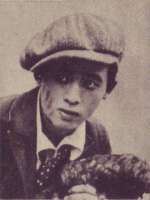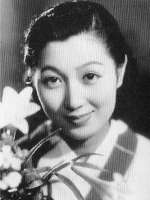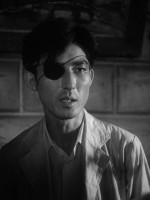Hideji Hōjō is a Scriptwriter Japonais born on 7 november 1902 at Osaka City (Japon)
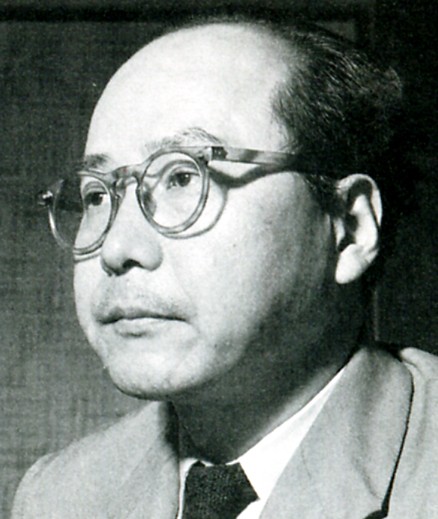
Hideji Hōjō (北条 秀司, Hōjō Hideji, November 7, 1902 - May 19, 1996), was the pen name of a Japanese author, novelist, and playwright in Shōwa period Japan. His real name was Iino Hideji (飯野 秀二)
During World War II, he was active in writing kokumingeki (government propaganda plays) such as "Tamna Tunnel", intended to help the war effort.
Hōjō was author of more than 200 plays and the leader of commercial theatre in Japan after World War II, working in a wide range of genre, from kabuki, to shimpa and Takarazuka Revues. In "Behind the Flower Garden" in 1960, he wrote a play in which actor Shotaro Hanayagi had to play both the male and female leads.
His psychological dramas about average citizens appealed to mainstream audiences. He is especially known for his screenplay adaptations of “Miyamoto Musashi”, “Genji Monogatari”, and many other historical dramas.
Hōjō was awarded numerous literary awards in his career, including the Shinchosha Prize, the Yomiuri Literary Award and the Kikuchi Kan Prize. In 1987, he was designated a Person of Cultural Merit by the Japanese government.
His grave is at the temple Ryuho-ji in Ofuna, Kamakura, where he lived for many years.
Source : Wikidata
Hideji Hōjō

- Infos
- Photos
- Best films
- Family
- Characters
- Awards
Nationality Japon
Birth 7 november 1902 at Osaka City (Japon)
Death 16 may 1996 (at 93 years) at Kamakura City (Japon)
Birth 7 november 1902 at Osaka City (Japon)
Death 16 may 1996 (at 93 years) at Kamakura City (Japon)
Biography
Born in Osaka and a graduate of Kansai University, Hōjō moved to Tokyo in 1926, and found employment with the Hakone Tozan Railway. In 1933, he quit his job to devote his attention to drama, becoming a student with Okamoto Kido and Hasegawa Shin. He became a leading member of the Shimpa modern drama movement in the 1930s.During World War II, he was active in writing kokumingeki (government propaganda plays) such as "Tamna Tunnel", intended to help the war effort.
Hōjō was author of more than 200 plays and the leader of commercial theatre in Japan after World War II, working in a wide range of genre, from kabuki, to shimpa and Takarazuka Revues. In "Behind the Flower Garden" in 1960, he wrote a play in which actor Shotaro Hanayagi had to play both the male and female leads.
His psychological dramas about average citizens appealed to mainstream audiences. He is especially known for his screenplay adaptations of “Miyamoto Musashi”, “Genji Monogatari”, and many other historical dramas.
Hōjō was awarded numerous literary awards in his career, including the Shinchosha Prize, the Yomiuri Literary Award and the Kikuchi Kan Prize. In 1987, he was designated a Person of Cultural Merit by the Japanese government.
His grave is at the temple Ryuho-ji in Ofuna, Kamakura, where he lived for many years.
Usually with
Filmography of Hideji Hōjō (7 films)
Scriptwriter

Floating Vessel (1957)
, 1h58Directed by Teinosuke Kinugasa
Genres Drama
Actors Kazuo Hasegawa, Fujiko Yamamoto, Ichikawa Raizō VIII, Nobuko Otowa, Ganjirō Nakamura, Tamao Nakamura
Roles Author
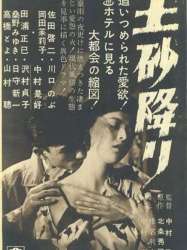
When It Rains, It Pours (1957)
, 1h45Directed by Noboru Nakamura
Genres Drama
Actors Keiji Sada, Mariko Okada, Sadako Sawamura, Sō Yamamura, Shinichi Himori
Roles Original Story
Rating74%





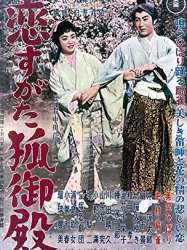
Koi Sugata Kitsune Goten (1956)
, 1h30Directed by Nobuo Nakagawa
Origin Japon
Genres Drama
Actors Hibari Misora, Kyū Sazanka, Eijirō Yanagi, Chieko Naniwa
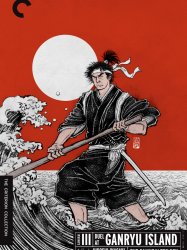 , 1h45
, 1h45Directed by Hiroshi Inagaki
Genres Drama, Action, Adventure, Historical, Romance
Themes Seafaring films, Sports films, Transport films, Martial arts films, Samurai films
Actors Toshiro Mifune, Rentarō Mikuni, Kaoru Yachigusa, Kōji Tsuruta, Mariko Okada, Takashi Shimura
Roles Theatre Play
Rating75%





Takezo (Musashi) abandons his life as a knight errant. He's sought as a teacher and vassal by Shogun, Japan's most powerful clan leader. He's also challenged to fight by the supremely confident and skillful Sasaki Kojiro. Takezo agrees to fight Kojiro in a year's time but rejects Shogun's patronage, choosing instead to live on the edge of a village, raising vegetables. He's followed there by Otsu and later by Akemi, both in love with him. The year ends as Takezo assists the villagers against a band of brigands. He seeks Otsu's forgiveness and accepts her love, then sets off across the water to Ganryu Island for his final contest.
 , 1h43
, 1h43Directed by Hiroshi Inagaki, Jun Fukuda
Genres Drama, Action, Adventure
Themes Seafaring films, Sports films, Transport films, Martial arts films, Samurai films
Actors Toshiro Mifune, Mariko Okada, Rentarō Mikuni, Kaoru Yachigusa, Kōji Tsuruta, Michiyo Kogure
Roles Theatre Play
Rating72%





Following Takezo's (Toshiro Mifune) capture by the Buddhist priest Takuan Sōhō, and stay in Himeji Castle. Takezo is granted his samurai name 'Musashi Miyamoto.' and leaves to search for enlightenment, leaving two messages for Otsu: "Soon I will be back" and "Forgive me." He goes to learn the way of the samurai and find those who will help him learn. But his first duel is with a challenger with a chain and a sickle who he fights and wins. After years on the road establishing his reputation as Japan's greatest fencer, Takezo travels to Kyoto. The now married Matahachi and Oko are settled there with Akemi. Otsu, having heard a rumor that Takezo is in Kyoto, has also travelled there to look for him. He meets Otsu who is in love with him but he tells Otsu he must follow what he loves more than her, the sword of the samurai.

Samurai I: Musashi Miyamoto (1954)
, 1h34Directed by Hiroshi Inagaki
Origin Japon
Genres Drama, Biography, Action, Adventure
Themes Seafaring films, Sports films, Théâtre, Transport films, Martial arts films, Samurai films, Films based on plays
Actors Toshiro Mifune, Rentarō Mikuni, Mariko Okada, Akihiko Hirata, Kaoru Yachigusa, Mitsuko Mito
Roles Theatre Play
Rating73%





Following the battle of Sekigahara, Takezo (Toshiro Mifune) and his friend Matahachi (Rentarō Mikuni) find themselves on the losing side. Instead of the grand victory and glory Takezo had anticipated, he finds himself a hunted fugitive, having to assist a severely injured Matahachi. The pair seek shelter with a widow and her daughter who unknown to them are connected to local brigands. The brigands soon show up and ask for tribute from what the women have stripped off dead samurai, and Takezo has to fight them off. Both women attempt to seduce Takezo but are rejected. The widow then tells Matahachi that Takezo tried to assault her and convinces him to escort her and her daughter to Kyoto. Matahachi agrees even though he loves (and is betrothed to) Otsu (Kaoru Yachigusa), a woman from his village.
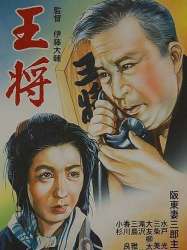
The Grand Master (1948)
, 1h34Directed by Daisuke Itō
Origin Japon
Genres Drama, Romantic comedy
Actors Tsumasaburō Bandō, Isamu Kosugi, Mitsuko Mito, Ryūtarō Ōtomo, Tatsuo Saitō, Osamu Takizawa
Roles Theatre Play
Rating68%





Japon, début du XXe siècle. Dans un quartier pauvre d'Osaka, Sankichi Sakata fabrique des sandales et est un amateur de shogi. Mais sa passion pour ce jeu d'échecs japonais devient une obsession, prenant le pas sur sa vie de famille et son travail. Au prix de durs sacrifices consentis par son épouse et de maintes péripéties, il parvient à battre le grand champion de shogi.
 Connection
Connection
